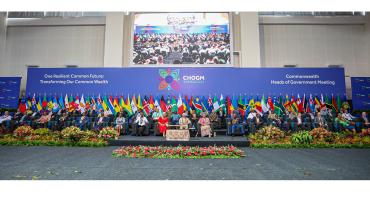Paper looks at the learning gained from the implementation of the Commonwealth Teacher Recruitment Protocol
The Commonwealth Secretariat will present a paper on the role and status of forced migrant teachers in emergencies at the UK Forum for International Education and Training International Conference on Education and Development at Oxford University on 13 September 2011.
Education Adviser at the Commonwealth Secretariat and one of the authors of the report, Jonathan Penson, said the paper was in response to concerns about the lack of qualified teachers in refugee communities and troubled areas, raised at the Sixth Commonwealth Research Symposium on Teacher Mobility, Recruitment and Migration in Addis Ababa, Ethiopia, in June 2011.
The study paper is a synthesis of research which found that teachers are not teaching in refugee communities as they are being attracted to better paying jobs with aid agencies or governments, or institutional barriers in their new host country prevent qualified teachers from teaching.
The paper, 'Beyond the Commonwealth Teacher Recruitment Protocol: next steps in managing teacher migration in difficult circumstances', was written by Mr Penson; Dr Akemi Yonemura, Programme Specialist at the UNESCO International Institute for Capacity Building in Africa; Barry Sesnan, Adviser at Echo Bravo Consultants; and independent education consultants Dr Kimberly Ochs and Dr Casmir Chanda. The paper will be presented at the conference by Mr Penson and Dr Yonemura.
| The biennial International Conference on Education and Development is one of the largest of its type, with over 400 participants from around the globe. |
Mr Penson said: “There is a lack of recognition of teachers' statuses in host country rules and regulations. For example, faced with stringent restrictions on refugee movement and employment in Botswana, migrant teachers from Zimbabwe frequently enter the informal sector, moving to urban areas. Being without papers, they are more vulnerable to exploitation.”
Mr Penson added that the same situation was seen in South Africa, where education agencies were keen to employ Zimbabwean refugees but bureaucratic requirements, lack of job security, and lack of support in cultural adaption make it difficult for teachers to work in the formal sector.
This results in disruption to children’s learning and may even contribute towards continuing exclusion of minority groups, as replacement teachers are taken from dominant groups.
The paper looked at the learning gained from the implementation of the Commonwealth Teacher Recruitment Protocol, which provides a framework for managing the migration of teachers which protects them, the education systems of source countries, and the interests of host countries.
The paper found that preparation is key: where countries have been most successful in implementing the protocol, they have carried out research to understand the scale and nature of migration, and designed strategies which anticipate teachers’ movements. They have also institutionalised the principles of the protocol through policy and legislation.
In this way Barbados has controlled outward migration. Similarly, the protocol has provided a framework for Rwanda to recruit Kenyan teachers so that both countries and the teachers benefit.
The paper recommends that multi-sectoral planning for emergencies be included in government policy. The overriding principle should be to understand the needs of forced migrant teachers, and be ready with responsive, flexible institutions which proactively address the issues that affect them and enhance their ability to operate constructively in emergency conditions.
The paper found that experienced teachers should also be encouraged to remain in the teaching profession even when they are displaced, in order to improve the delivery of education for refugee children.
'Beyond the Commonwealth Teacher Recruitment Protocol: next steps in managing teacher migration in difficult circumstances' will be included in a forthcoming collection of papers presented at the Sixth Commonwealth Research Symposium on Teacher Mobility, Recruitment and Migration, which will be published jointly by the Commonwealth Secretariat and UNESCO.



